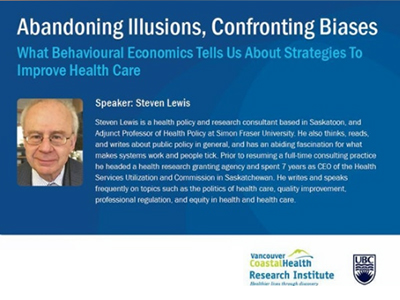
Cognitive bias in providers and patients leads to bad decisions and wasted resources.
A stunning 30 per cent of health care spending in Canada may be wasted on services that are either ineffective or harmful. That’s the conclusion of many health care analysts. The solution? A better understanding of human psychology. This unique approach is at the core of the upcoming annual public lecture at the Centre for Clinical Epidemiology and Evaluation (C2E2). The feature speaker is Steven Lewis, a health policy analyst and consultant.
Lewis says it’s time to address the cognitive biases of all stakeholders in the system that lead to wasted resources. “We presume that people are rational, but we are all hardwired with biases that produce irrational decisions. In health care, this has huge consequences for cost and treatment,” Lewis says.

Lewis has many examples of wasted health care resources that spring from these biases. “Low back pain is a classic example. The evidence is clear that many interventions, from surgery to medication, are not helpful. But there’s a tendency to think that more is better. We think that if physiotherapy helps, then surgery must help even more. It’s called intervention bias.”
Overall, Lewis says too many useless tests and interventions are being done—and paid for with both public and private money.
There is this idea that early detection is the holy grail of health care. We have come to believe, based on our inability to assess risk accurately, that if you get every test available you will avoid disease or nip its consequences in the bud.
“In case after case, it’s just not true. Yes, it matters in colon cancer. It seems not to matter so much in breast cancer. Often, it doesn’t change anything at all.” In fact, Lewis says, too much intervention can prove harmful, from excessive exposure to CT scan radiation, to the stress of false-positives, to the over-medication of elderly patients.
Another bias Lewis cites is called the sunk-cost bias. He says health care institutions continue to use obsolete and ineffective technology because they spent a lot of money on it. Another problem is practitioners ordering what they know to be useless tests because of an unwarranted fear of being sued for not covering all the bases.

This makes it hard for Canadians to avoid the torrent of ads urging people to medicalize minor conditions and to ‘ask their doctor’ to prescribe them drugs, says Lewis. “The pharmaceutical companies have figured out how to exploit the cognitive biases we have and the irrational fears we feel in order to sell more product.”
Until policy makers and practitioners acknowledge and address these biases, we will continue to be bewildered by why so much health care decision-making contradicts the best available scientific evidence. There is a huge gap between what we know is best and what we actually do.
Empowering patients to choose critically
Lewis says some progress is being made with national campaigns like Choosing Wisely—an initiative that advises clinicians and patients on avoiding wasteful or unnecessary procedures and tests. He says the awareness of bias has to start in health care education and then move to individual interactions between patients and providers.
“We need to change the way we offer choices to patients. It makes a huge difference if you give them the honest evidence about the risks and benefits of a procedure or diagnostic instead of consciously or unconsciously biasing them to intervention or fear. You will get different outcomes.”

“This message meets our mandate: we push for more evidence-informed decision making in health care in Canada,” says Dr. Bryan. “Behavioural and economic strategies can improve the quality of decision making, so we need to listen and learn from what Steven has to say.”
Lewis will answer questions from the audience after the lecture and will then meet with decision makers, faculty, staff and students to discuss his work. He says the stakes couldn’t be higher.
“This is a $228 billion industry. Even if we can cut waste by 10 per cent, that’s how much it would cost to bring every Canadian above the poverty line. It’s an enormous opportunity.”



